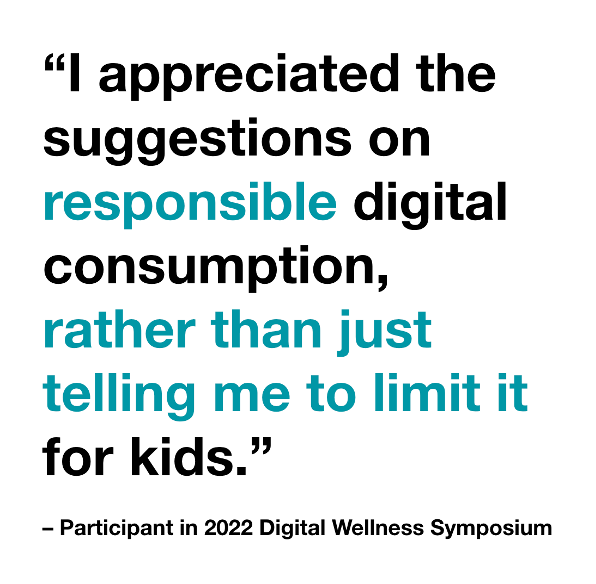 “I know the right answer is to tell an adult, but I would not tell an adult. I would ask my friend Lucy for advice.” This was a 7th grader’s response to a quiz question about cyberbullying. The student was clear that while she knew the “correct” answer, it wasn’t the action she would take in real life.
“I know the right answer is to tell an adult, but I would not tell an adult. I would ask my friend Lucy for advice.” This was a 7th grader’s response to a quiz question about cyberbullying. The student was clear that while she knew the “correct” answer, it wasn’t the action she would take in real life.
Schools tend to focus on talking about digital wellness, encouraging students to earn “cyber-savvy” certificates or creating “be kind online” posters- but they don’t necessarily offer opportunities to discuss their concerns with adults. Rather than “do and don’t” lectures, our young generations need safe spaces to talk about and brainstorm strategies for healthy, productive online lives.
But having grown up with fewer screen options themselves, caregivers often struggle with how to navigate their children’s digital lives. We know that some of the top concerns that parents are when to introduce their children to screens and what is an appropriate amount of daily screen time. They also want to learn more about healthy onscreen activities. Many have expressed a concern that they might be judged as parents about their decisions. There is no one-size-fits-all solution, but it is clear that both parents and children are looking for guidance in a non-judgemental space.
 After over a decade of talking with middle school children, we have learned the importance of conversation over lecture when trying to move the needle with students’ choices around device use. We’ve also learned that children want to talk about what, why, and how they engage online – if they are in a space that is judgment-free. They also want their parents to better understand the significance of devices in their everyday lives: that devices are often a pathway to positive influences that provide comfort and satisfy many social needs.
After over a decade of talking with middle school children, we have learned the importance of conversation over lecture when trying to move the needle with students’ choices around device use. We’ve also learned that children want to talk about what, why, and how they engage online – if they are in a space that is judgment-free. They also want their parents to better understand the significance of devices in their everyday lives: that devices are often a pathway to positive influences that provide comfort and satisfy many social needs.
This is why we developed the University of Michigan Digital Wellness Symposium for Youth and their Caregivers. Our half-day virtual event was designed to create a fun, interactive, and judgment-free free space for caregivers and youth to have facilitated conversations about screen time and use.
When we asked our parents and youth participants about their experience with the symposium, 100% of them said the event met or exceeded their expectations! Every participant also felt that the symposium helped generate conversation with their family members and that the activities were engaging and fun.
We hope our event’s success will give families the confidence to have similar conversations at home. Here are some tips for parents:
- Talk often. Instead of waiting until problems arise, have regular, low-stakes conversations – during car rides, cooking, or walks – about what your family is doing on your devices and how it feels. This will help children feel that online life is something that is OK and safe to talk about. It will also make them more willing to come to you when something feels wrong online.
- Explore new tools together. You can model how you think through your decision-making, look up information about the app, and even set a trial period. Even if the ultimate answer is no, tweens will more likely understand the decision-making process if they are a part of it. A side benefit? Opportunities to explore and be curious together.
- Embrace the gray areas. Too often, advice for parents is framed as a good/bad binary. The truth is likely somewhere in the middle. We adults know that sometimes some Instagram is fun, but too much might mean scrolling past our bedtime. Similarly, some gaming for tweens is fun escapism with friends, but too much can be a withdrawal from the real world.
- Remember that youths are human. Post-pandemic children are living in a different world than their parents did. For tweens, screen time is more than consuming content: there are social, relationship, and reputational issues associated with device use. Adults can help by understanding and honoring that worldview before leaping in with rules or solutions.
- Remember that parents are human, too! We recognize that parents are struggling and grappling with pressure from their children to have devices or apps, societal pressure about what “good” caregivers do, and an innate desire to keep their children safe and healthy in a complicated world. What works best for one child may not work well for another. Decisions should be centered around your family’s morals, ethics, finances, and the unique needs of your child.
Our next symposium is Saturday, January 21, and we’re eager to hear from families nationwide. Learn more and register here.
The 2022 & 2023 Digital Wellness Symposia are made possible in part by the University of Michigan Center for Teaching and Learning, the University of Michigan School of Education, the University of Michigan School of Information, and MACUL.

Liz Kolb is a clinical associate professor at the University of Michigan School of Education where she works with preservice and in-service teachers on integrating technology into K-12 teaching. She is the author of numerous books and articles related to educational technology, most recently Learning First, Technology Second: In Practice.
 Kristin Fontichiaro is a clinical professor at the University of Michigan School of Information, where she works at the intersection of libraries, learning, and leadership. She is the author and editor of numerous books on information, digital, and data literacy for educators, librarians, and K-8 students, most recently Making in School and Public Libraries, Creating Data Literate Students, and Data Literacy in the Real World: Conversations and Case Studies.
Kristin Fontichiaro is a clinical professor at the University of Michigan School of Information, where she works at the intersection of libraries, learning, and leadership. She is the author and editor of numerous books on information, digital, and data literacy for educators, librarians, and K-8 students, most recently Making in School and Public Libraries, Creating Data Literate Students, and Data Literacy in the Real World: Conversations and Case Studies.

